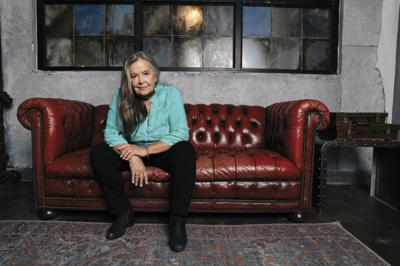
Tracy Nelson
The songs on Nashville-area singer and songwriter Tracy Nelson’s first album in 12 years, Life Don’t Miss Nobody, might represent an attempt to sum up the history of R&B — that useful blanket term for Black music in North America in the late 20th century — as an agent for social change. Life Don’t Miss Nobody, released June 9,is the testament of one of the era’s finest singers, and Nelson applies her rich voice to a set of songs that register as post-blues, or maybe almost-blues. It’s an album that’s composed of echoes from the past, but Nelson bears down on every song in a way that cuts through the jive in real time, just like blues is supposed to do.
Nelson tracked Life Don’t Miss Nobody at Nashville’s Sound Emporium Studios with co-producer Roger Alan Nichols, and it was completed at various locations around the country. Life echoes the history of R&B via Nelson’s immaculate covers of songs that have been recorded by the likes of Irma Thomas and Johnny Adams. Nelson has, in fact, been a master singer since her days in the late ’60s as vocalist for the rock ’n’ roll-meets-R&B band Mother Earth. You can hear the influence of Irma Thomas and blues shouter Ma Rainey on her style, and Nelson is aware of her place in the lineage of those great singers.
“I had to kinda stop covering Irma [Thomas],” Nelson tells me from across the table at a West Nashville bar. She’s referring to an Allen Toussaint song titled “I Did My Part” that appears on Life Don’t Miss Nobody. The cut on the album features vocals by Texas blues singer Marcia Ball and Irma Thomas herself, and Nelson first recorded the tune for Mother Earth’s 1968 debut album Living With the Animals. Nelson’s voice is heavier than it was then, when she was living in San Francisco during the era of the Grateful Dead and Quicksilver Messenger Service.
“I mean, it just got ridiculous,” Nelson continues. “Marcia [Ball] used to do that song too, so it was an obvious choice. But I went back and listened to Irma’s version, mainly ’cause I wanted to pick the key she did it in. I did it in the same key, and I listened to hers, and then mine — identical. It was embarrassing how much I just totally copied Irma.”
Nelson’s career includes stops on major labels, a Grammy nomination for a 1974 duet with Willie Nelson — who sings Hank Williams’ “Honky Tonkin’” on Life Don’t Miss Nobody — and a break from releasing albums that lasted from 1980 until 1993. Indeed, a major theme throughout is the anxiety of influence that many blues artists have felt since the 1960s. Nelson might have named her rock band after a song by blues singer Memphis Slim, but she’s never been limited by the genre.
Nelson was born in Madison, Wis., in 1944, and she grew up listening to R&B on Nashville radio station WLAC and taking classical piano lessons. She heard the Chicago blues of Muddy Waters and Otis Spann in that city in the mid-’60s, and moved to the Bay Area in 1966. Along with fellow Mother Earth member Powell St. John, Nelson synthesized rock ’n’ roll and New Orleans R&B on Living With the Animals, which contains her best-known song, the metrically challenging 6/8 ballad “Down So Low.” The follow-up, 1969’s Make a Joyful Noise, was cut at Mt. Juliet studio Bradley’s Barn with a set of Nashville studio musicians that included pianist Hargus “Pig” Robbins and pedal-steel player Pete Drake, among others.
Nelson made the move to Nashville in 1969 after touring with Mother Earth for Make a Joyful Noise. Later that year, she recorded the pioneering country-rock album Mother Earth Presents Tracy Nelson Country with former Elvis Presley guitarist Scotty Moore, and she released four more albums with Mother Earth. (The group’s live sound is documented on 2017’s Live in New York 1971.) Nelson’s work on albums like 1973’s Poor Man’s Paradise has its moments — her takes on material by songwriters Eric Kaz and Bobby Charles are first-rate.
Every song on Life Don’t Miss Nobody makes its statement about transience, hard times and the political unrest that connects 1969 to 2023. Nelson rocks out Sister Rosetta Tharpe’s “Strange Things Happening Every Day” and explores fatalism in the Los Lobos-meets-The Mavericks grooves of the title track, which she wrote with her partner, Mike Dysinger.
Still, it’s the hard grooves of Gene McDaniels’ 1966 social protest song “Compared to What” that anchor Life Don’t Miss Nobody. Les McCann and Eddie Harris’ 1969 hit version of the tune combined ’60s modal jazz with lyrics about the absurdity of politics. Nelson reclaims the song as a piece of living history, and her precise vibrato and immaculate phrasing make her version something more than just a cover of a well-known song.
“We tried to kinda go second-line,” she says about the song. “But it’s like, [drummer] John Gardner and, you know, the Nashville session [musicians], how they do second-line. I’ve wanted to do that since I was in college, when I first heard the song.”
“Compared to What” is progressive music — Steve Conn’s piano and Terry Hanck’s saxophone hit as hard as anything you might hear this year. It encapsulates the approach of a singer who has made, somewhat improbably, what might be her finest album in the face of the disappearance of the history she’s known forever.









